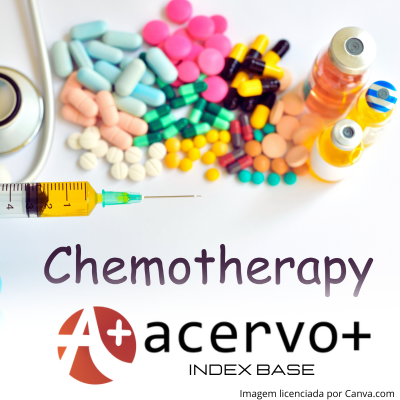Adesão à quimioterapia oral
##plugins.themes.bootstrap3.article.main##
Resumo
Objetivo: Apresentar os estudos já produzidos em relação aos principais motivos que influenciam a adesão e a não adesão ao tratamento com antineoplásicos orais, investigando as barreiras e facilitadores relacionados à doença e ao seu tratamento. Métodos: Trata-se de uma Revisão Integrativa da literatura, com artigos publicados entre janeiro de 2013 a junho de 2023, com texto completo disponível. Utilizou-se como questões norteadoras: “Principais motivos que contribuem para a não adesão à terapia oral” e “Oportunidades para melhorar a adesão à terapia oral”. A pesquisa bibliográfica foi realizada nos meses de maio e junho de 2023, sendo realizadas buscas na base de dados Pubmed, por meio dos descritores: "oral chemotherapy" e "adherence", o processo de seleção de trabalhos para o presente artigo foi realizado por meio de revisão por pares, de forma independente. Resultados: A pesquisa resultou em 14 artigos que obedeceram aos critérios de inclusão e exclusão. Considerações finais: Os principais facilitadores da adesão ao tratamento foram o grau de informação dos pacientes sobre seu tratamento, o acompanhamento multiprofissional e as principais barreiras à não adesão foram o esquecimento e as reações adversas ao medicamento.
##plugins.themes.bootstrap3.article.details##
Copyright © | Todos os direitos reservados.
A revista detém os direitos autorais exclusivos de publicação deste artigo nos termos da lei 9610/98.
Reprodução parcial
É livre o uso de partes do texto, figuras e questionário do artigo, sendo obrigatória a citação dos autores e revista.
Reprodução total
É expressamente proibida, devendo ser autorizada pela revista.
Referências
2. CARVALHO MS, et al. Comitê de publicações em estudo multicêntrico e sistema informatizado de apoio - publiELSA. Rev Saúde Pública. 2013; 47: 48–53.
3. DAVIS TC, et al. Assessment of Oral Chemotherapy Nonadherence in Chronic Myeloid Leukemia Patients Using Brief Measures in Community Cancer Clinics: A Pilot Study. Int J Environ Res Public Health. 2021; 18(21): 11045.
4. DENNISON T, et al. A Pharmacist-Led Oral Chemotherapy Program's Impact on Chronic Myeloid Leukemia Patient Satisfaction, Adherence, and Outcomes. J Adv Pract Oncol. 2021; 12(2): 148-157.
5. ENGLE JA, et al. Assessment of adherence and relative dose intensity with oral chemotherapy in oncology clinical trials at an academic medical center. J Oncol Pharm Pract. 2018; 24(5): 348-353.
6. GEBBIA V, et al. Adherence, compliance and persistence to oral antineoplastic therapy: a review focused on chemotherapeutic and biologic agents. 2012; 11(1): S49-59.
7. GHIGGIA A, et al. Adherence to oral chemotherapy: Evidence from a randomised clinical trial. Eur J Cancer Care (Engl). 2021; 30(1): 13336.
8. GÖNDEREN ÇHS e UNCU D. Relationship between Health Literacy and Medication Adherence of Turkish Cancer Patients Receiving Oral Chemotherapy. Asia Pac J Oncol Nurs. 2020; 7(4): 365-369.
9. GIL C. Como elaborar projetos de pesquisa. São Paulo: Atlas; 2017; 6.
10. HEFNER J, et al. Patient-doctor relationship and adherence to capecitabine in outpatients of a German comprehensive cancer center. Patient Prefer Adherence. 2018; 12:1 875-1887.
11. ISAAC EI,et al. Longitudinal Patterns of Social Problem-Solving Skills in an Ethnically Diverse Sample of Pediatric Patients with Cancer and their Caregivers. Int J Environ Res Public Health. 2020; 17(5): 1581.
12. ISAAC EI, et al. Patient Experiences With Oral Chemotherapy: Adherence, Symptoms, and Quality of Life. J Natl Compr Canc Netw. 2019; 17(3): 221-228.
13. LEA CS, et al. Exploring behaviors, treatment beliefs, and barriers to oral chemotherapy adherence among adult leukemia patients in a rural outpatient setting. BMC Res Notes. 2018; 11(1): 843.
14. MCGRADY ME, et al. Medication adherence decision-making among adolescents and young adults with cancer. Eur J Oncol Nurs. 2016; 20: 207-14.
15. NEDEL WL e SILVEIRA FDA. Os diferentes delineamentos de pesquisa e suas particularidades na terapia intensiva. Rev bras ter intensiva. Associação de Medicina Intensiva Brasileira - AMIB; 2016; 28(3): 256–260.
16. OLIVEIRA FR, et al. Adherencia a tratamientos antineoplásicos orales.Farm. hosp, 2014; 38(6): 475-481.
17. PATEL K, et al. Oral cancer chemotherapy adherence and adherence assessment tools: a report from North Central Cancer Group Trial N0747 and a systematic review of the literature. J Cancer Educ. 2013; 28(4): 770-6.
18. REGNIER DV, et al. Adesão à quimioterapia oral: Resultados de um estudo qualitativo do comportamento e representações de pacientes e oncologistas. EUR. J. Cancer Care. 2011; 20: 520–527.
19. SABATE E. Adherence to long-term therapies: evidence for action. World Health Organization (WHO), 2013.
20. STOKES M, et al. Impact of pharmacy channel on adherence to oral oncolytics. BMC Health Serv Res. 2017; 17(1): 414.
21. SUGISAKA ACA, et al. Validação de Materiais Educativos para Orientação de Pacientes em Tratamento de Câncer de Mama com Hormonioterapia. Rev Bras Cancerol, 2020; 66(4): 051079.
22. SCHNEIDER SM, et al. A tailored nurse coaching intervention for oral chemotherapy adherence. J Adv Pract Oncol. 2014; 5(3): 163-72.
23. SIMONS S, et al. Enhancing adherence to capecitabine chemotherapy by means of multidisciplinary pharmaceutical care. Support Care Cancer. 2011; 19(7): 1009-18.
24. TALENS A, et al. Medication Experience and Adherence to Oral Chemotherapy: A Qualitative Study of Patients' and Health Professionals' Perspectives. Int J Environ Res Public Health. 2021;1 8(8): 4266.
25. VERBRUGGHE M, et al. Fatores que influenciam a adesão em pacientes com câncer que tomam inibidores orais de tirosina quinase. Enfermeiras do Câncer. 2016; 39: 153–162.
26. XAVIER FD, et al. Treatment of elderly patients with refractory/relapsed multiple myeloma: oral drugs adherence and the COVID-19 outbreak. Oncotarget. 2020; 11(47): 4371-4386.

